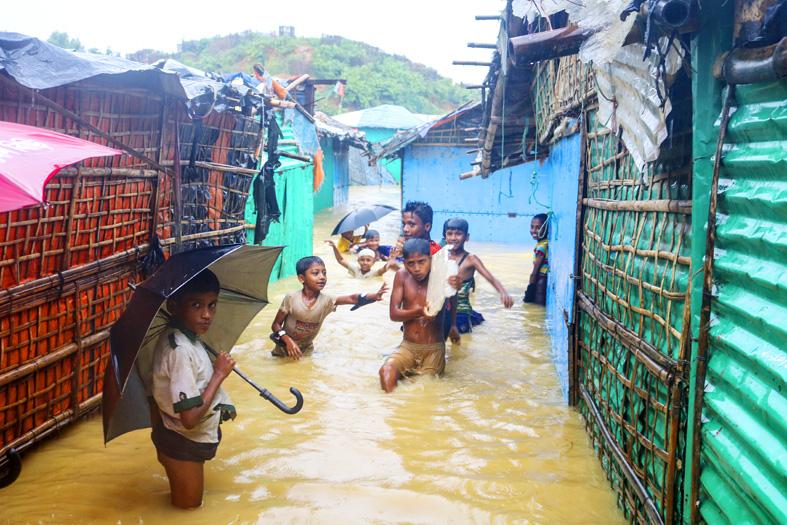Days of heavy rainfall have pelted Rohingya refugee camps in southern Bangladesh, destroying dwellings and sending thousands of people to live with relatives or in communal shelters.
On Wednesday alone, more than 30cm of rain fell on the camps in Cox’s Bazar, which host more than 800,000 Rohingya, the UN High Commissioner for Refugees said.
That is nearly half of the average July rainfall in one day, while more heavy downpours are expected in the next few days in a monsoon season that stretches over the next three months.

Photo: AP
“The situation is further compounded by the COVID-19 pandemic,” the agency said. “There is currently a strict national lockdown in response to rising cases across the country.”
The agency said that it was saddened by the deaths of six people at the camps earlier this week, five in a landslide caused by the rains and a child swept away by floodwaters.
More than 12,000 refugees have been affected by the heavy rainfall, while an estimated 2,500 shelters have been damaged or destroyed, the agency said, citing initial reports.
More than 5,000 refugees have temporarily been relocated to other family member’s shelters or communal facilities, the agency said.
Refugees said that they were struggling to eat or drink properly.
“Due to the continuous rainfall for the last four days, today my house is full of water,” said Khatija Begum, who has five children. “We are not even able to eat.”
Begum said she fears that her children will drown and die in their sleep.
Cyclones, heavy monsoon rains, floods, landslides and other natural hazards are an annual difficulty in the camps.
More than 700,000 Rohingya have lived in refugee camps in Bangladesh since August 2017, when the military in Buddhist-majority Myanmar began a crackdown on the Muslim ethnic group following an attack by insurgents.
The crackdown included rapes, killings and the torching of thousands of homes, and was termed “ethnic cleansing” by global rights groups and the UN.
While Bangladesh and Myanmar have sought to arrange repatriations, many Rohingya fear returning home.
The International Organization for Migration has said that Cox’s Bazar, where more than 1 million Rohingya refugees live, is one of the most disaster-prone parts of Bangladesh.
It is a delta nation crisscrossed by many rivers that gets intense rainfall regularly due to its monsoon climate and location on the Bay of Bengal, where the warm waters can generate destructive tropical cyclones.

A magnitude 5.6 earthquake struck off the coast of Yilan County at 12:37pm today, with clear shaking felt across much of northern Taiwan. There were no immediate reports of damage. The epicenter of the quake was 16.9km east-southeast of Yilan County Hall offshore at a depth of 66.8km, Central Weather Administration (CWA) data showed. The maximum intensity registered at a 4 in Yilan County’s Nanao Township (南澳) on Taiwan’s seven-tier scale. Other parts of Yilan, as well as certain areas of Hualien County, Taipei, New Taipei City, Taoyuan, Hsinchu County, Taichung and Miaoli County, recorded intensities of 3. Residents of Yilan County and Taipei received

Taiwan has secured another breakthrough in fruit exports, with jujubes, dragon fruit and lychees approved for shipment to the EU, the Ministry of Agriculture said yesterday. The Animal and Plant Health Inspection Agency on Thursday received formal notification of the approval from the EU, the ministry said, adding that the decision was expected to expand Taiwanese fruit producers’ access to high-end European markets. Taiwan exported 126 tonnes of lychees last year, valued at US$1.48 million, with Japan accounting for 102 tonnes. Other export destinations included New Zealand, Hong Kong, the US and Australia, ministry data showed. Jujube exports totaled 103 tonnes, valued at

TRUST: The KMT said it respected the US’ timing and considerations, and hoped it would continue to honor its commitments to helping Taiwan bolster its defenses and deterrence US President Donald Trump is delaying a multibillion-dollar arms sale to Taiwan to ensure his visit to Beijing is successful, a New York Times report said. The weapons sales package has stalled in the US Department of State, the report said, citing US officials it did not identify. The White House has told agencies not to push forward ahead of Trump’s meeting with Chinese President Xi Jinping (習近平), it said. The two last month held a phone call to discuss trade and geopolitical flashpoints ahead of the summit. Xi raised the Taiwan issue and urged the US to handle arms sales to

BIG SPENDERS: Foreign investors bought the most Taiwan equities since 2005, signaling confidence that an AI boom would continue to benefit chipmakers Taiwan Semiconductor Manufacturing Co’s (TSMC, 台積電) market capitalization swelled to US$2 trillion for the first time following a 4.25 percent rally in its American depositary receipts (ADR) overnight, putting the world’s biggest contract chipmaker sixth on the list of the world’s biggest companies by market capitalization, just behind Amazon.com Inc. The site CompaniesMarketcap.com ranked TSMC ahead of Saudi Aramco and Meta Platforms Inc. The Taiwanese company’s ADRs on Tuesday surged to US$385.75 on the New York Stock Exchange, as strong demand for artificial intelligence (AI) applications led to chip supply constraints and boost revenue growth to record-breaking levels. Each TSMC ADR represents